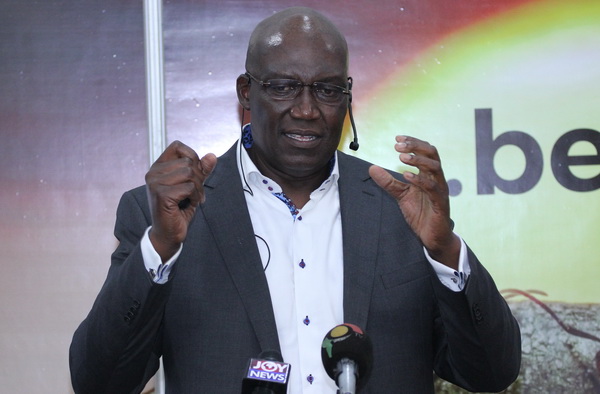
Face up to realities, the country is broke – Analyst tells Finance Minister
The government has been called upon to face the reality of the state of the Ghanaian economy, as the country is broke and is heading for a disaster.
The Chief Executive Officer (CEO) of Dalex Finance and Leasing Company Limited, Mr Kenneth Kwamina Thompson, who made the call, said in 2017, the country spent almost a 100 per cent of all its ‘revenue, including grants’, on only three line items — interest payments, compensation to employees and statutory payments such as the Ghana Educational Trust Fund (GETFund), the District Assemblies Common Fund and the National Health Insurance Scheme (NHIS).
“Since we spend over 100 per cent of our revenue on these three items, all our other expenditures are made from monies borrowed,” he stated.
Mr Thompson stressed that the way to reverse the economic trend was for the government to increase income, cut expenditure or do both.
He was speaking at this year’s “A conversation with Ken — Ghana’s Economy in 2018”, an annual event hosted by the Chartered Institute of Marketing, Ghana (CIMG), during which Mr Thompson, a chartered accountant by profession, discussed the state of the economy.
The theme for the conversation was to get Mr Ken Ofori-Atta, the Minister of Finance, to “face up to the realities” of the Ghanaian economy.
Mr Thompson also indicated that any natural or man-made disaster “could send us into a default tailspin of government obligations, causing intolerable hardship, widespread business failures and mass unemployment”.
Stop borrowing
In a hypothetical conversation with Mr Ofori-Atta, Mr Thompson emphasised that the government should stop borrowing to fund recurrent expenditure and only borrow to fund development expenditure which could yield returns.
“We are borrowing to fund consumption and not to fund investment. Our debt is piling up (70 per cent of GDP) and we may not be in a position to repay in future.
“Our only hope is to increase revenue in the short to medium term in order to fund consumption expenditure,” he stated.
![]()
Increase revenue
With the current rising wage and salary bill, rising interest expense, widespread business collapse and mass unemployment, the government, he said, had to take tough decisions because the country was sitting on a time bomb.
“We are not likely to reduce our expenditure on salaries in the short term, and even though there has been some capping of statutory obligations, the net effect is negligible. We must increase revenue,” Mr Thompson stressed.
He suggested that to increase revenue in the short term, the government must increase taxes across the board and make it time-bound for three years.
“Furthermore, it must enforce evidence of tax payment on property registration such as vehicle, company and land title registration, while the informal sector must start paying individual taxes, he said.
He noted that the best way the government could sell this idea to the public was for politicians “to share in the pain” by cutting down on the public expenditure to support their lifestyles.
Focus on agriculture
According to Mr Thompson, another way to improve the economy was for the government to focus on agriculture in a realistic way.
Agriculture, he said, employed over 53 per cent of the labour force and “so it is the magic ‘silver bullet’ to our economic development”.
He indicated that the Planting for Food and Jobs and the One-Village, One-Dam initiatives were well-conceived but their success would depend on the implementation of effective strategies.
He proposed separate strategies for export and for local consumption, adding that farmers should be provided with technical support, such as improved seeds and methodology, and “not just with imported fertiliser”.
Cedi overvalued
He also stated that the cedi was overvalued, making Ghanaian exports expensive and uncompetitive, while imports were relatively cheap.
“That had resulted in stunted economic development and unemployment,” he said.
Mr Thompson emphasised that the Planting for Food and Jobs programme was at risk because the proposed factories would be uncompetitive because of the overvalued cedi.
